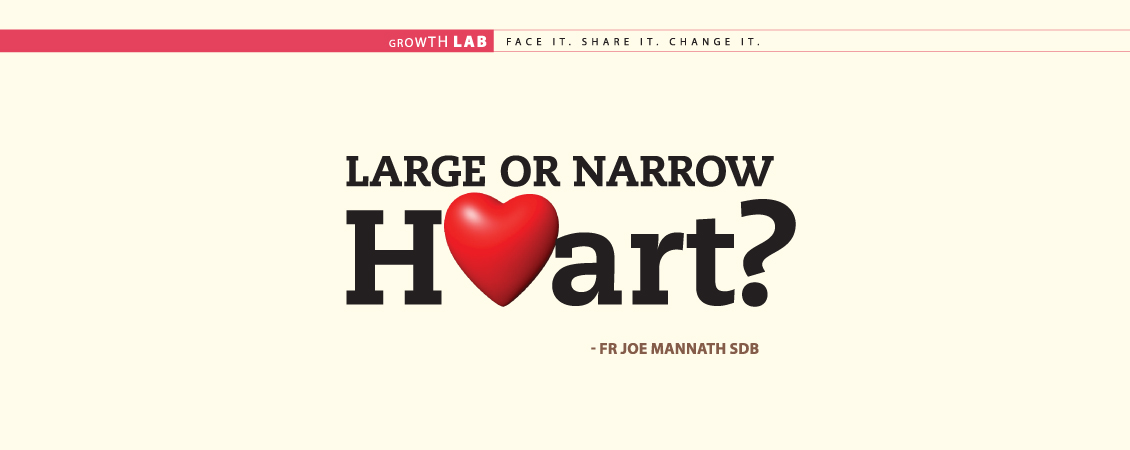Suggested points for reflection, personal writing, group sharing, group prayer and committed action on multicultural issues. If you are discussing this in a religious community, you will need about 10-15 minutes for personal reflection and writing, another 45-60 minutes for mutual listening (not mutual attacks!), and a wise, acceptable person to lead the discussion.
- Names or initials of my ten closest friends (outside my immediate family):………………………………………………………………………………………
- Groups they belong to: Which “groups” do they belong to—by nation, region, race, language, caste, tribe, etc.?……………………………………………………………………………………
(The people you are closest to influence you the most. And they reveal much about your values, and about your largeness or narrowness of heart.)
- When I meet new people, what do I notice or look for? Physical attraction, money, education, place of origin, caste, tribe, religion, character, commitment, shared values: …………………………………..
(My preferences show what is important for me.)
- As I grow up, has my heart expanded or got narrower?………………………….
(Both things can happen. I can open my heart and mind to different persons and groups, or close myself against those I consider “outsiders.” A lot depends on my main values and the persons closest to me.)
- Do I know persons who are known as good human beings—who mix with all, help anyone in need, and who do not discriminate? Many / some / very few / hardly any
- Is multiculturalism (living and working with mutual understanding and respect towards persons of various cultures) a problem in your religious order or diocese or province? Yes, very much / Yes, occasionally / Not much / Not at all
- On what basis do people in your community tend to experience divisions—language, region, caste, tribe, race, money, ….?
- Are there mean and cruel expressions of division and bigotry? Which? Anonymous letters / meetings in secret / seniors favouring “their own” / superiors partial towards their “own group” / appointments made according to the group a person belongs to / financial abuses stemming from this / vocation promotion following group preferences rather than the qualities of the candidate / ……………………………………….
- List some of the prejudices of “your group” about outsiders, eg, what you heard at home when you were small? “People of that place or caste or language or tribe are………………………………………………………………………………………………………………………..Are these factual? How many persons of that group actually have these traits?…………
- What are the main positive and negative traits of your group?
Positive: ……………………………………………………………………………………………………………………….
Negative: ………………………………………………………………………………………………………………………..
- Would the world be better if everyone had the traits your group has? Yes / No
- Would the world be good/bad/poor/awful/ridiculous….if all of us were equal in mother tongue, looks, tastes, behaviour, ….?
- As a priest or religious or Christian leader, what should be my ideal? Help my group? Help all? Help the neediest and the most discriminated against?
- The Gospels are counter cultural: They challenge us to accept the good points from all, but reject the inhuman traits in all. Which aspects of my culture are worth propagating? Which should be challenged, changed or even given up?
- Would our works in India be possible if Christians elsewhere thought: “Let us help our own. Why should we help people of other places or races?” Yes / No
- What have your learnt from mixing with persons of different cultures?
…………………………………………………………………………………………………………………………….
- By the time you die, what kind of a human being do you want to become: A universal human being open to all? A bigoted person boasting of one’s culture and putting down others? An enemy of the “outsider”? A large-hearted person welcoming the refugee, the orphan, the persecuted—whatever their background?
- What are the main reasons for “groupism” and divisions—greed, fear, search for power, search for money, prejudices rising from ignorance,…?
- Will you be happier living with: only persons from your place, caste, tribe, age, religion, race, country….or with people from a variety of backgrounds? Why? …………………….
……………………………………………………………………………………………………………………………….
- Is religious faith meant to divide human beings (“We are better, others are bad,…”) or bring people together? Open our heart to others, as God’s beloved children, or reject them as dangerous outsiders, heretics, infidels, unclean, etc.?
- Jesus is our model, teacher and norm: For whom did he care? With whom did he mix? Did he tell us that any group is better than others? Would he approve our excluding persons and groups from our love and respect?

To subscribe to the magazine Contact Us



